As it's remembrance Sunday today, I thought it would be appropriate to give you another one of my Picture Posts from the Imperial War Museums archive collection. Today we are going to follow Mrs. Pat Macleod and Miss Winifred Ashford as they go about their daily duties as part of the MTC.
Before we meet them I think a bit of history about the MTC wouldn't go amiss. I thought I would find loads of information about this service but to my surprise, there is actually very little to be found about the MTC online or in books. I know if it was not for the character of Sam Stewart in Foyle's War (ooh Just learnt there will be a series 8 airing in 2013!!!) many of us, me included would never have heard of them.
So first a bit of History... The MTC or to give it is full name the Mechanised Transport Corps, was founded in 1939 by Mrs G.M Cooke CBE as a Women's Uniformed Voluntary Civilian Organisation, it was designed so that women who had family or other existing commitments, could still do their bit for the war effort by driving on a part-time basis.
 |
| Mrs. G.M.Cooke OBE Image Taken from the War Relics Forum (Source) |
Vehicle Maintenance. - 16 hours minimum.
Map Reading. - 71/2 hours minimum.
Practical. - Stretcher Drill and Respirator Drill - 4 1/2 hours.
Special Lectures. - Gas, Driving and Breakdown Procedure, Convoy Driving, Duties of Drivers, Vehicle Inspection, Security.
Corps Lectures - To acquaint recruits with the administration of the Corps.
Squad Drill - Two periods daily.
Driving practice is given when necessary.
Further training is given, fortnightly or monthly in the unit or company to which the driver is posted. (Quote Source)
Once trained they would be posted to a unit/company and then be assigned to work as drivers for Several foreign governments, the Ministry of Agriculture, Health, Information and Supply and also for the Anglo-American Ambulance unit. Many also traveled abroad and were drivers in France, Egypt, Palestine, and Syria.
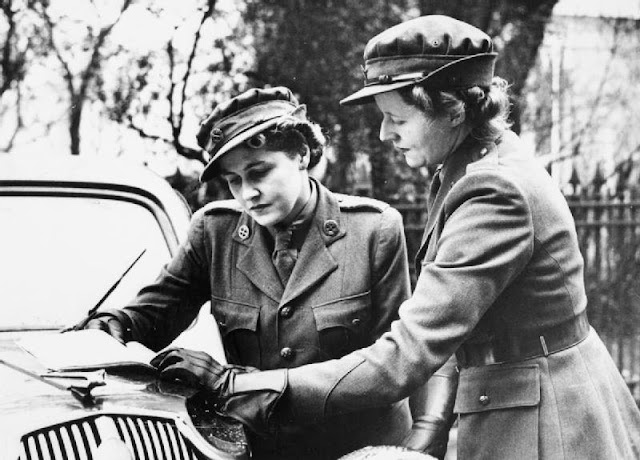 |
| Image Taken from the War Relics Forum (Source) |
So back to our girls Pat and Winifred. It has taken a little detective work to figure out the story behind today's post . At first glance it would appear that the girls below are American and that's certainly what the archivist thought went typing up the descriptions, in fact, theses two girls are preparing to leave for America to create awareness and support for the people back home by telling their story of life working for the MTC in war-torn London.
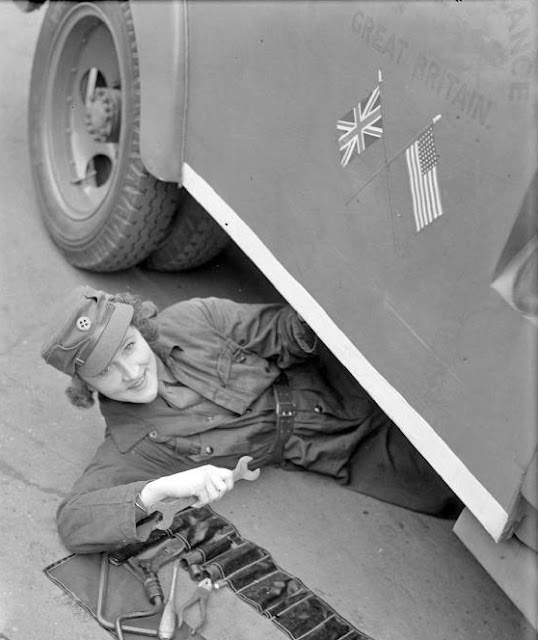 |
| Mrs. Pat Macleod slides out from under the ambulance she is repairing to smile for the camera. She is doing maintenance work on ambulance 8, which was presented by Elliott Nugent Esq. through the American Field Service. The depot is probably somewhere in Paddington in London. Painted on the side of the vehicle are the British and American flags, confirming that this ambulance is part of the American Ambulance, Great Britain. |
 |
| Miss Winifred Ashford and Mrs Pat Macleod open up their mobile canteen in front of a pile of rubble and some severely bomb-damaged houses, London, 1940. |
 |
| Miss Winifred Ashford and Mrs Pat Macleod enjoy a cup of tea beside their mobile canteen amongst rubble and other debris. In the background, St. James's Church, Paddington, can be seen. The spire of the church is shrouded in scaffolding, as it was badly damaged in an air raid. |
Miss Winifred Ashford, Mrs Pat Macleod and a helper from the Pioneer Corps shut up the mobile canteen after supplying refreshments to men of the Pioneer Corps who have been clearing up bomb damage. Behind the canteen, the damaged houses can be clearly seen: three men of the Pioneer Corps can be seen on an upper floor. Also visible are the ARP car which tows the canteen and another car, parked behind the canteen.
 |
| In the rest room at their depot, Miss Winifred Ashford, Mrs Pat Macleod and other members of the Mechanised Transport Corps relax. Seated in front of the fireplace, Miss Ashford reads a newspaper and Mrs Macleod mends an item of clothing whilst their colleagues smoke and play with the depot's kitten. Can you spot the dog? |
Initially, I struggled to find any information at all on these two ladies - It is always much harder to find the women than the chaps as they tend to get married and change their names. Frustrating! But then I stumbled across some articles on Google's Newspaper database dating from 1941, which I have transcribed below, they offer a fascinating insight into daily life of the MTC.
The first article gives us a bit of background on these two women and explains exactly what they were up to while visiting America.
Mobile Feeding Unit Here For Tour Of City Today
Two British Women, Veterans Of Service Under London Bombing, To Demonstrate War Work
---Will Show Film.
---Will Show Film.
Miss Winfred Ashford and Mrs. Pat Macleod, ace drivers of the Mechanized Transport Corps of England, will tour Meriden today with a Mobile feeding Unit similar to that the Meriden chapter of the British war relief society is maintaining in war-torn Britain.
These women who will give Meriden residents first-hand information concerning their war work will appear in Crown Street Square at 11:30a.m. until 12:30p.m. in front of the NEW Departure plant on Pratt Street at 2:45p.m. in front of factory E, International Silver company, on State Street at 4:45 p.m. and in front of city Hall auditorium at 7:15p.m.
Film at City Hall
At 8:15 they will show a sound moving picture taken under the "Blitz" in London "Thumbs Up" in the city Hall auditorium. There will be no charge of any kind and the public is cordially invited.
Miss Ashford, a dress designer before the war, volunteered for service during the Munich crisis. Her establishment in Bond street, London was bombed out during the "Blitz" she has done night duty without a break since the outbreak of war in the greatly bombed dock area of London.
Mrs. Macleod comes from Dover, England. Before the war she travelled widely and has done big game shooting in the Kalahari Desert. She has frequently fed as many as 300 people in a night when she had been on duty with the Mobile Feeding Unit and has done fire duty as well.
Both these women have survived the worst of London's bombing, exhibiting great bravery and cool heads in the midst of violent action.
The second article which can be found in a few publications has been written by Pat Macleod, Now it is quite long but it gives us a great insight into exactly what these women were facing on a daily basis.
'Good Housewife Makes the Best Member Of The Mechanised Transport Corps Of England'
By Mrs Pat Macleod
NEW YORK - Driving trucks and repairing cars used to be considered a man's domain. But over in England we members of the Mechanized Transport Corps (a corps of women drivers and mechanics) have proved that the better the housewife, the better MTC member.
It's in keeping her vehicle spick and span that the housewife's training is particularly valuable. Each morning for example, she must go over her car's tires literally with a tooth pick to pick out the pieces of glass that litter many roads. If she drives a mobile kitchen, as I do, she must be particularly careful about cleanliness because of health hazards.
We women drivers are responsible for our care and for their care. Each morning we must put on our overalls, check oil, gas and water, make any necessary repairs. Then we drive our car to a permanent parking place and wait for calls.
We live the life of a fireman as far as hours are concerned - often working 12 to 24 hours straight. Once I did 36 hours at a stretch during the big London fire in December. And during the period when we are working, we are constantly on call. Its hard work - tough work. With hours that sometimes seem like days. There's no gainsaying that But by this time everyone knows that Englishwomen can take it. It was easier for me than for some others perhaps, because I had volunteered at the French Military Hospital in Biarritz during the last war and had seen six months service as an ambulance driver.
EACH CALL IS AN 'INCIDENT'
When this war began I enlisted in the MTC and since have driven almost every kind of wartime vehicle under almost every circumstance and condition. Now with the mobile kitchen unit, I go about feeding thousands who pack shelters, those who lie wounded in air raid ruins or those who keep on bravely living in the skeletons of dwellings they call homes.
The car we use is a three piece trailer affair - a sedan pulling two trailers. The vehicle as a whole weighs three tons.
I have an assistant - a paid air-raid precautions worker, and a district to cover - Paddington allied with military objectives such as gas works railroad terminals, power stations, ammunition dumps.
Each call we make is called an 'incident' which seems to amuse Americans. An 'Incident' is undertaken usually about a half hour after the raid call sounds. The depot department may report: "Causalities are heavy - better take enough for 400 people". I drive to a place where most people are likely to be gathered - frequently under direct bombing attack.
Then when the shrapnel has ceased beating a tune on my tin hat, I set up shop. Queues form, and I serve food. It's wholesome food, but nothing elaborate, for we cook on three burners over canned gas. We rely pretty much on canned food. We get sausages and cut sandwiches of fish paste. We make fresh soup every day, serve coffee, tea, cocoa and in summer gingerbread and lemonade.
MAPS ARE VITAL I'm frequently asked what is most important in an MTC job. In my opinion it's maps - just plain everyday street maps - and that surprises most people. But consider when the call comes in the dead of night and you set out for a given destination, all is pitch dark. The black out is on. You cannot see your streets and alleys. you must know them. You must have memorised each landmark and remember where the bombs have fallen and the streets are filled with great holes. And that is nor enough - you must have the last minute word on this. Even as you leave, a shell hole may have appeared on a new place and you drive in to certain destruction unless last minute checks are made by phone and radio. Sometimes your travels become circuitous. But in your first training, maps are fairly banged into your head. MTC members undergo a very strenuous three-week training course during which you learn map reading, car maintenance, convoy driving, first-aid, gas precaution and drill for two hours every day.
Someone usually asks me: Can the women stand it? Can they and how, as Americans say. More than ninety percent of the London women can take it and fit in to some picture or other: just as we MTC members have fitted into our jobs somehow, you begin to forget danger, just want to get where your going and help. Bravery is probably catching. when you see bombed babies, when you view the blast remains of historic landmarks your people have been proud of for centuries past, it's easy to take repairing a car with grease on your hands and in your hair. British women can take it, as the members of the MTC prove. We have been called brave - if we are, it's because we have caught it, from the staunch, heroic citizenry we serve.
I think you'll agree the girls of the MTC were very courageous women, especially considering during much of the war (until the Ministry of War Transport eventually recognised it) they were volunteers who received no pay. As little can be found online about the women of the MTC, I hope this post will go away to help them not be forgotten.
If you enjoyed this post you can read more about women of the MTC below, or if you fancy looking through some my past Picture Posts click the tab at the top!
Further Reading:
Wendy x

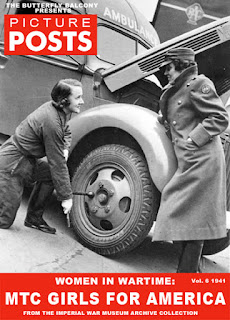

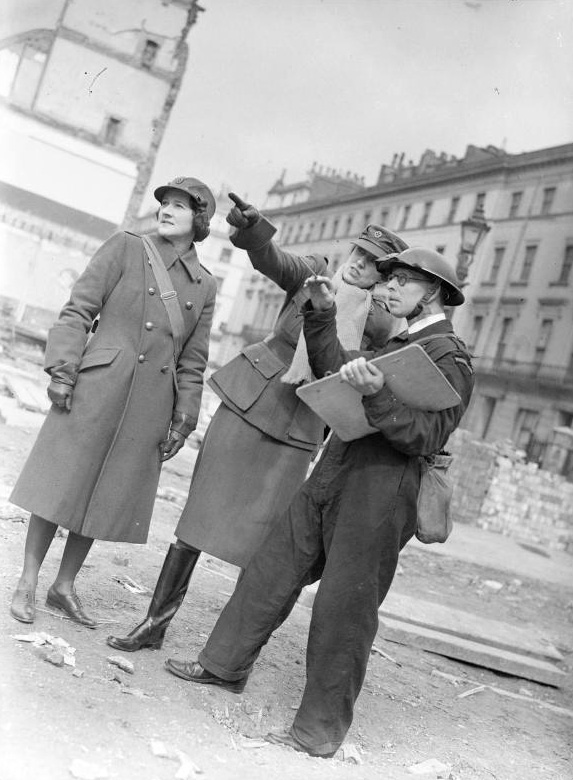

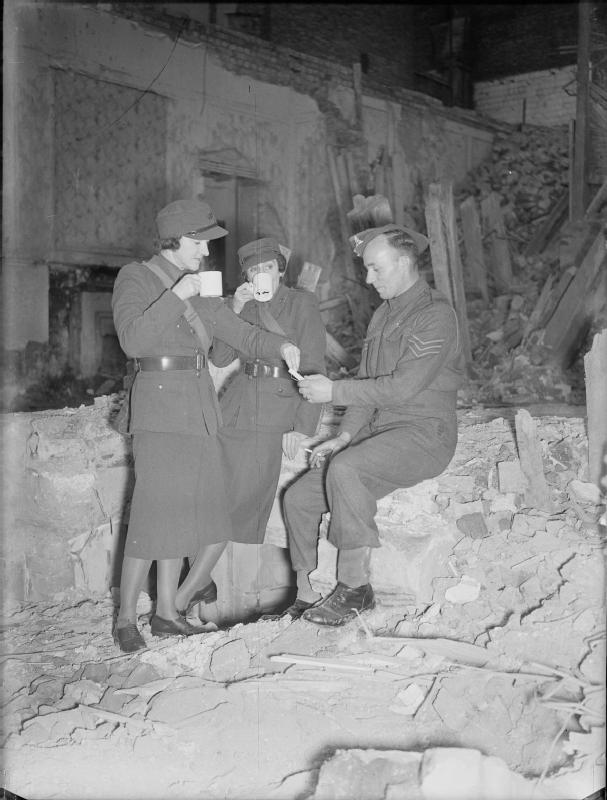


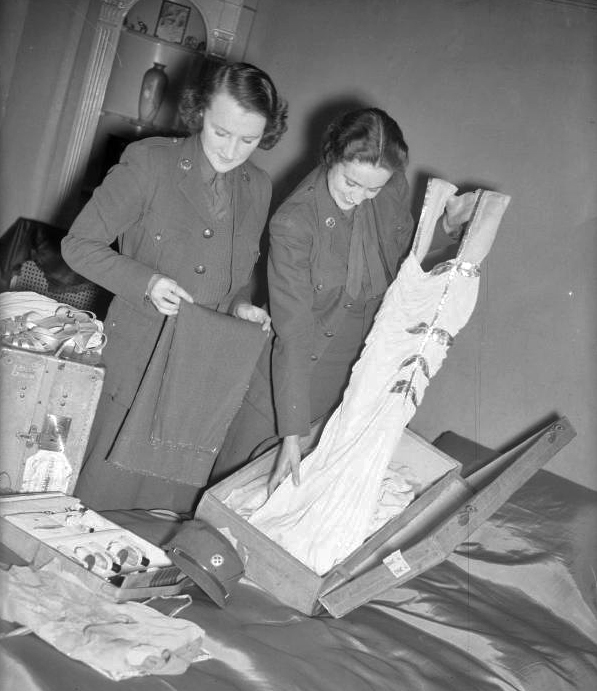
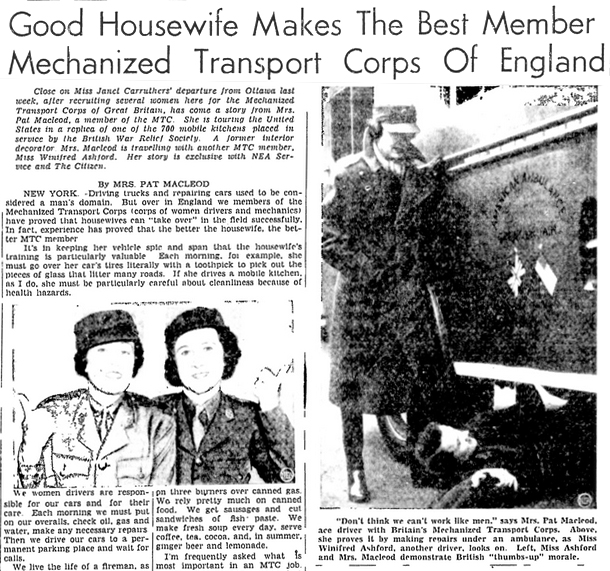






That made very interesting reading as you don't hear a lot about women at war
ReplyDeleteJulie xxxxxxxxx
Wow! Great post!! Lots of interesting information and fab photos, I love seeing the women's perspective of the war, thank you for posting!
ReplyDeleteWow! Great post!! Lots of interesting information and fab photos, I love seeing the women's perspective of the war, thank you for posting!
ReplyDeletebalcony dangers